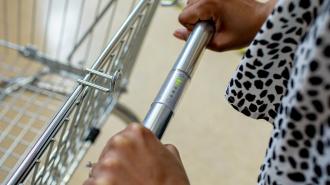A UK study found that sensors placed in shopping cart handles can be used to detect atrial fibrillation (AFib). More work is needed to increase the accuracy of the system, but it could be a straightforward way to screen for a heart condition that regularly goes undiagnosed.
The challenge: In a healthy heart, the two upper chambers beat in sync and at a steady pace, but in the estimated 40 million people worldwide with AFib, this beating is uncoordinated and usually too fast or too slow.
Having AFib increases a person’s risk of having a stroke five-fold, but taking anticoagulant medication can reduce this risk. Most people with AFib have no symptoms, though, and doctors typically don’t screen asymptomatic people for the disorder.
As a result, an estimated 15% of AFib cases are undiagnosed.
Having AFib increases a person’s risk of having a stroke five-fold.
The idea: In search of a way to reduce the number of undiagnosed AFib cases, researchers at Liverpool John Moores University decided to see if they could make screenings a part of people’s daily lives.
To that end, they integrated electrocardiogram (ECG) sensors into the handles of 10 shopping carts. Over the course of two months, they deployed the carts at four supermarkets in Liverpool to see if they could detect AFib in willing shoppers.
SHOPS-AF: The 2,155 adults who took the researchers up on the offer to use the carts were asked to grip the handle for at least 60 seconds while shopping. If the sensor did not detect AFib, a light on it lit up green. If it did detect the condition, the light glowed red.
After every reading, an in-store pharmacist manually checked the person’s pulse. If the sensor had turned red, the pharmacist also took another ECG reading — this time the shopper stood still and gripped a handle that had a sensor, but wasn’t attached to a cart.
The study cardiologist then reviewed the ECG recordings of the 220 people identified as having potential AFib by the sensors or the pharmacists’ pulse readings. They informed 59 of the shoppers that they had AFib and set up cardiology appointments for the 39 who were previously undiagnosed.
The cardiologist cleared 115 of the 220 people of the condition, but they couldn’t make a determination one way or the other based on the ECG recordings of the remaining 46 people.
The cold water: The accuracy of this approach needs improvement. Only 26% of those flagged as having AFib received a positive diagnosis from the cardiologist — even if you assume the 46 “unclear” results were AFib, the positive accuracy was less than 50%
The study authors also estimate their approach likely missed about half of the people who do have AFib, too.
“That’s 39 people at greater risk of stroke who received a cardiologist appointment.”
Ian Jones
Looking ahead: The researchers acknowledge the need to make adjustments to their system to improve its accuracy — they think having designated grip spots on the handle might help — but are still optimistic that the method could lead to more AFib diagnoses.
“Over the course of two months, we identified 39 patients who were unaware that they had atrial fibrillation,” said study author Ian Jones. “That’s 39 people at greater risk of stroke who received a cardiologist appointment.”
“Nearly two-thirds of the shoppers we approached were happy to use a trolley, and the vast majority of those who declined were in a rush rather than wary of being monitored,” he added. “This shows that the concept is acceptable to most people and worth testing in a larger study.”
We’d love to hear from you! If you have a comment about this article or if you have a tip for a future Freethink story, please email us at [email protected].






